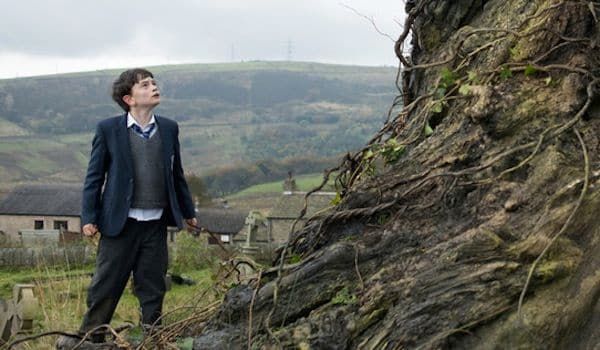Eye For Film >> Movies >> A Monster Calls (2016) Film Review
A Monster Calls
Reviewed by: Amber Wilkinson

A tsunami blasted its way through family tranquility in Juan Antonio Bayona's The Impossible and water is also a key - and devastating - element of A Monster Calls, although here it's the steady trickle of unremitting British rain, bringing with it a melancholy that gradually soaks its way down to the bones of the film.
Young Conor (Lewis MacDougall) lives with is mum (Felicity Jones) in small town England (in a slightly odd disconnect for UK viewers, the place looks distinctly northern, yet all the accents are southern). Conor loves his mum, who has been pulling double parental duty since the breakdown of her marriage, especially as his dad (Toby Kebbell) now lives in the States with his new family. But now mum is sick with cancer and getting sicker, leading the already vulnerable Conor to be a bundle of conflicted emotion that marks him out as a target for bullies at school and brings him terror in the night.

Imagine his surprise then, when after one nightmare, the ancient yew tree from the nearby churchyard unfurls itself and thunders down the hill to his doorstep, promising to tell him three stories before Conor must relate one in return that will reveal "the truth" about his bad dream. It's a classic structural idea, deployed with creativity by Patrick Ness, adapting the screenplay from his own book. The first of the stories unfolds in flowing water colour as the monster (Liam Neeson on craggy vocals) begins to challenge Conor's expectations - "there's not always a good guy". Later tales are equally imaginative but subtly different to stop the action falling into a predictable groove.
Bayona also keeps the water colour idea running elsewhere in the film, from the opening credits to moments when rain snakes down window pains, rendering everything behind it in soft, smudgy focus - particularly at night.
The yew tree isn't the only monster Conor feels like he's dealing with. He views his grandma (Sigourney Weaver, unecessarily forced to attempt a British accent) as an existential threat. In a beautiful scene that exemplifies her attitude and that of the average child like Conor, we see her instructing him "not to touch anything", before watching him roam the house inspecting the lot. "Stories are wild creatures," Conor is told and there is an uninhibited feel to his monster, a streak of danger even in the face of the young boy's courage. Questions remain as to target audience, there is a strong Guillermo del Toro inflluence but this is not the intricately woven adult psychological landscape of Pan's Labyrinth, while young children - or those that have suffered loss - will almost certainly find it too upsetting.
Still, Bayona knows how to turn the screw of sentiment, not so much jerking tears as gradually filling a well of sadness until it can't help but spill out. Some might call that monstrously manipulative. I say, take at least two tissues.
Reviewed on: 06 Oct 2016
















